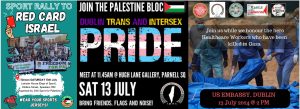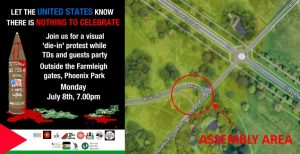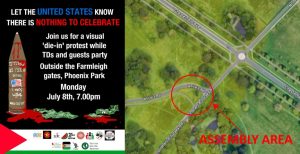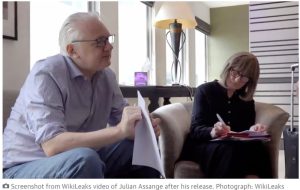Contents
- Agenda
- Motions
- Donating to the Irish Anti-War Movement
- Setup a Standing Order
- Donate with PayPal
1. Agenda
- Standing Orders 13:00-13:05
- Summary of last year’s activities 13:05-13:15
- Reports from other anti war / solidarity groups 13:15-13:45
- Discussion (30 minutes) 13:45-14:15
- Financial Report 14:15-14:20
- Motions (40 minutes) 14:20-14:50
- Election of Steering Committee 14:50-15:00
2. Motions
To download a PDF version of the Motions submitted go to
https://www.irishantiwar.org/files/IrishAntiWarMovementAGM-2012Motions.pdf
Motion 1: I propose that the IAWM should affiliate to PANA.
Motion 2: The assessment of the IAWM is that the effects of the recession will continue to take the foreground of political opposition in Ireland. But it also believes that, given the ongoing instability of the war on terror, the shifts in US foreign policy, and the inevitable nationalism that accompanies economic depressions, military aggression, war and occupation will remain a feature of the present period. We note, too, that in earlier periods, anti-war mobilisations can sometimes be the expression of more generalised political discontent. Our priorities for 2012 will therefore be:
Contents
- Agenda
- Motions
- Donating to the Irish Anti-War Movement
- Setup a Standing Order
- Donate with PayPal
1. Agenda
- Standing Orders 13:00-13:05
- Summary of last year’s activities 13:05-13:15
- Reports from other anti war / solidarity groups 13:15-13:45
- Discussion (30 minutes) 13:45-14:15
- Financial Report 14:15-14:20
- Motions (40 minutes) 14:20-14:50
- Election of Steering Committee 14:50-15:00
2. Motions
To download a PDF version of the Motions submitted go to
https://www.irishantiwar.org/files/IrishAntiWarMovementAGM-2012Motions.pdf
Motion 1: I propose that the IAWM should affiliate to PANA.
Motion 2: The assessment of the IAWM is that the effects of the recession will continue to take the foreground of political opposition in Ireland. But it also believes that, given the ongoing instability of the war on terror, the shifts in US foreign policy, and the inevitable nationalism that accompanies economic depressions, military aggression, war and occupation will remain a feature of the present period. We note, too, that in earlier periods, anti-war mobilisations can sometimes be the expression of more generalised political discontent. Our priorities for 2012 will therefore be:
1. The regular hosting of public events and meetings around the themes of Arab Revolution, Afghanistan, Palestine, the changing face of US hegemony, the US’s focus on Iran, Ireland and EU -NATO militarisation and any other issues that may arise.
2. Placing specific focus on the exposure of the role of the Labour party in Government whether around its compliance with greater integration with EU-NATO or with its failure to close down Shannon as a military base.
3. Mobilisations around events of aggression on the part of US, NATO-EU and Israel and Ireland’s involvement in these.
4. The production of a regular newsletter for members of the IAWM.
5. Working with other solidarity and activist groups on the issues noted above
Signed: Steering Committee, IAWM
STEERING COMMITTEE STATEMENT
1. The Arab Revolutions. The IAWM recognises that the revolutions across North Africa and the Middle East, which began in Tunisia, have changed the dynamics of the present phase of western domination in the region. They have propelled the Arab peoples on to the stage of history and challenged decades of western rule though local dictators. The outcome of the revolution in Egypt is still being played out with the protest movement calling for a ‘second revolution’ in 2012. In Syria, in the long term, political impact of mass mobilisation against the country’s dictator and his western allies has yet to be seen. In Bahrain and Saudi Arabia, the protest movements are being viciously suppressed by regimes still supported by the US. But the significance of the Arab revolutions in 2011 and their ability to unravel the agenda of the west for the region cannot be underestimated.
2. Rehabilitation of ‘humanitarian intervention’. The US administration (along with their NATO allies) clung to the old ruling dictators as long as it could, but was forced, finally, to place itself inside the revolutionary process, in an attempt to steer political events back towards its control. The IAWM recognised the so-called ‘humanitarian intervention’ in Libya as part of this strategic about- turn . It opposed the NATO –UN backed bombing of Libya and argued that it was motivated by strategic geopolitical interests, not humanitarian ones. The number of deaths on both sides – over 16,000 according to some reports – would seem to confirm that the western intervention escalated the military conflict. Even today NATO still refuses to investigate its role in killing of civilians. Despite the difficulty in winning wide support for our anti-intervention position in Libya, we believe that events have proved our position to be correct.
3. Iraq and the use of Shannon. At the end of 2011, The United States officially announced the end of the war in Iraq and withdrawal of all troops at the end of 2011. With hundreds of thousands Iraqis dead, the US leaves behind chaos, a broken infrastructure, poor living conditions, and the increasingly authoritarian control from Maliki’s Shiite collation. Sadly, what we in the anti-war movement foresaw in 2003 has turned out to be the case.
Today, the US-NATO led strategy for Iraq is in tatters. The US’s original plan was that it would oust Saddam Hussein, dismantle the Baathist government and make Iraq the American headquarters along what they called "the arc of instability," extending from the horn of Africa through Afghanistan. Instead, the occupation has turned into a catastrophe for the U.S. Its invasion produced mass resistance and then a civil war. The vast majority of the Iraqi people turned against the occupying troops, causing escalating difficulties for the U.S. plans in Iraq and the region. At the end of nine years of occupation, the US have not even managed to retain a small military presence.
Despite the withdrawal of US troops in Iraq, Shannon airport continues to be used by the US as a stopover for its troops to Afghanistan, Kuwait and other locations. With not a whimper of opposition from the Irish establishment, Shannon has now become a permanent military base for the US. The IAWM will continue to seek the widest support for its opposition to this development.
4. Afghanistan and Pakistan and US terrorisation strategy. The recent revelations of US marines urinating on the dead bodies of Afghans is a reminder yet again of the degrading treatment that Afghanis, dead or alive, receive at the hand of the occupying forces.The war on Afghanistan continues to result in severe civilian casualties mainly with the use of drone attacks and indiscriminate night raids. NATO troops are due to leave in 2014 but it is likely that they will stay long after that date. The Taliban have increased their support since the invasion and it is now with them that the West (despite having previously ruled this out) will be forced to negotiate. The troop surge launched by Obama, supposedly to further counter-insurgency after the assassination of Osama bin Laden, has been revealed as the plan that it really is – to terrorize the populations of both Afghanistan and Pakistan into abandoning resistance to the NATO presence. But through the vicious and cowardly drone attacks, the US is stoking mass popular opposition to its presence, now reflected even among the client governments in both countries.
The IAWM continues to call the cessation of Irish involvement in the NATO- ISAF occupation of Afghanistan. It further calls on the Minister of Foreign Affairs to publicly condemn the drone attacks.
5. American Empire weakened. While the U.S. is still the largest imperial power on the planet, it is also the case that the U.S. is the weakest it has been since the end of the Second World War. The economic crisis has forced the Pentagon to cut back its military spending which undermines its role as a global aggressor. Obama, with the opportunism of a true imperialist, has officially announced that now the US needs to redirect its attention away from the Middle East in order to address possible challenges to its hegemony that it faces in Asia, particularly China.
In this context, US foreign policy has shifted from troop occupation to Special Forces and drone wars – both of which are cheaper, more targeted and do not involve US casualties. Drone activity has spread, from Yemen to Afghanistan and even Mexico. The U.S. is increasingly looking to drones as an alternative vehicle for implementing their foreign policy initiatives. American officials are also looking to Special Forces attacks as a compliment to the drone strikes. In the last year alone, the U.S. has conducted Special Forces operations in 70 countries around the world.
However with the backdrop, in the long term, of declining US power, such moves constitute a riskier strategy for the maintaining of global dominance and more prone to provoking local and global outrage.
6. Iran, regime change and nuclear weapons. The US focus on Iran has to be seen in this light. The US wants to ensure that Iran will not become the symbol of geopolitically independent Middle East. It therefore wants to see regime change in Iran – hence the sabre rattling over Iran’s nuclear programme and the absurd allegation that Iran was behind the plot to assassinate the Saudi ambassador to the U.S. The Obama administration wants to transform Iran’s state-controlled economy into an open market for international investments, especially in the oil industry. Thus, Iran remains, for the US ideological enemy Number One and also at constant risk of military attack.
The IAWM condemns the continuing threats against, and escalation of tension with, Iran by the US, NATO and Israel and the highly suspicious assassinations of Iranian scientists. The main pretext for this is the allegation that Iran is in the process of developing nuclear weapons and the threat is of some kind of strike or intervention to prevent or punish this.
The IAWM is opposed to nuclear weapons in general but absolutely rejects the right of the US (which possesses by far the world’s largest nuclear arsenal) or the West to decide which countries may or may not hold such weapons. This is particularly unacceptable in view the fact that the US’s principle ally in the region, Israel, is known to posses such weapons. The notion of ‘Our nukes good, their nukes bad ‘ is imperialist and implicitly racist in its assumptions. As a pretext for an armed strike or war which would have catastrophic implications for the people of Iran, for the people of the whole region and potentially for us all, we reject it utterly.
The IAWM commits itself to oppose any aggression against Iran and to mobilise on the streets in the event of any armed attack or war. This opposition to aggression and war does not of course signify political support for the Iranian regime.
7. Palestine. The Arab revolutions have shown Palestinians that change of the ruling order can happen and they have triggered a desire for unity between the contending factions of Hamas and Fatah. The have also alerted Israel to the power of popular mobilisation which has made the Zionist state up its aggression towards Palestinians and seek a copper- fastening of its occupation beyond what its bankroller and protector, the US, may seek.
Solidarity with the Palestinians and the plight Gaza under Israeli strangulation is deeply felt across large sections of Irish society. Our involvement with the Irish Ship to Gaza showed the extent of Irish support for Palestine and showed how well different strands of the Palestinian anti-war, peace, and trade union movement can work together. This cooperation around Palestine we see as important to continue. The campaign to further isolate Israel through the Boycott, Divest and Sanction campaign has been popular in the past. Many young people identify with the cause of Palestine and as Israel appears to be ramping up the war rhetoric, mobilisations around this issue will remain a continued priority for the IAWM.
3. Donating to the Irish Anti-War Movement
3-1. Setup a Standing Order
To set-up a standing order with the Irish-Anti War Movement please go to the following link https://www.irishantiwar.org/files/standing-order-form.doc fill in the form and post to the Irish Anti-War Movement P.O. Box 9260 Dublin 1.
3-2. Donate with PayPal
Follow this Link.






